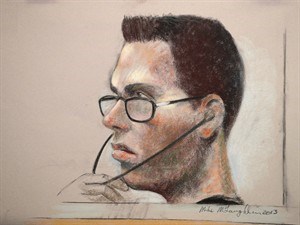
Luka Magnotta is shown in an artist's sketch in a Montreal court on March 13, 2013. A judge has prevented Montreal police from getting their hands on a confidential academic video interview with accused killer Magnotta.THE CANADIAN PRESS/Mike McLaughlin
January 22, 2014 - 8:07 AM
MONTREAL - A judge has prevented Montreal police from getting their hands on a confidential academic video interview with accused killer Luka Rocco Magnotta.
The Canadian Association of University Teachers welcomed the Quebec Superior Court decision, saying it upholds researchers' rights to protect confidential information needed for their academic work.
The association's executive director says in a statement the ruling represents the first court recognition of researcher-participant privilege.
Montreal police had sought to gain access to a copy of the interview for evidence they're still gathering against the 31-year-old Magnotta, who is charged with first-degree murder in the slaying and dismemberment of Chinese engineering student Jun Lin.
Lawyers representing University of Ottawa criminologists had argued the 2007 interview with a subject known under the pseudonym "Jimmy" should be kept confidential.
The attorneys said Magnotta participated in the study as part of a survey of sex workers under the condition his interview would remain confidential.
"The impact of this decision is that researchers can now have confidence that courts will recognize and will treat seriously promises of confidentiality vital to the conduct of their research," James Turk, executive director of the Canadian Association of University Teachers, said in a statement Wednesday.
"Courts have recognized the social importance of journalists being able to protect confidential sources, and this decision extends a similar recognition to academic researchers."
The news release published by Turk's association said that, in her ruling, Justice Sophie Bourque noted "much academic research… provides useful information on certain aspects of the human condition that are normally kept silent."
The Bourque ruling was also quoted by the association as saying: "The evidence demonstrates that much of the research involving vulnerable people can only be conducted if human participants are given a guarantee that their identities and the information that they share will remain confidential."
News from © The Canadian Press, 2014